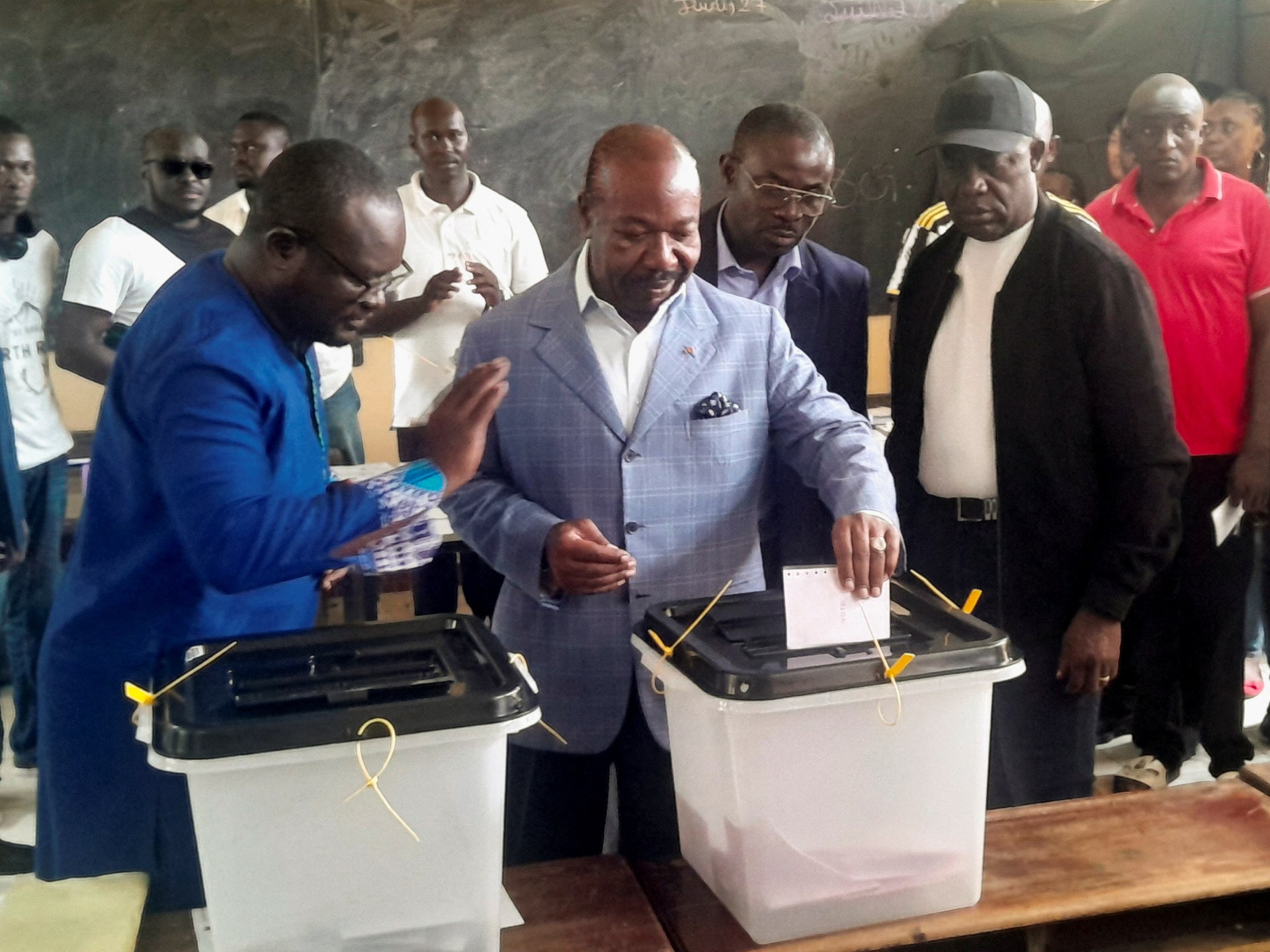A group of senior military officers has gone on national television in Gabon saying they have seized power because elections held over the weekend were not credible.
The officers, appearing on Gabon 24 in the early hours of Wednesday morning, said they had cancelled the elections, dissolved all state institutions and closed the country’s borders.
They said they represented all security and defence forces of Gabon.
The announcement came shortly after the state election body said President Ali Bongo Ondimba had won a third term in office in Saturday’s disputed elections.
“In the name of the Gabonese people … we have decided to defend the peace by putting an end to the current regime,” the officers said.
The Gabonese Election Centre said Bongo had secured 64.27 percent of the vote compared with 30.77 percent for his main challenger Albert Ondo Ossa, after a process beset by delays.
Al Jazeera’s Catherine Soi, reporting from Kenya, said that “there are lots of uncertainties” surrounding the military action.
“There is a lot of tension as well. They [military leaders] are claiming that the government has not been respecting the will of the Gabonese people for so many years and they say that has to change,” said Soi.
On Saturday, the opposition camp said the election was a “fraud orchestrated by Ali Bongo and his supporters” after the internet was cut and a curfew imposed. French media outlets France 24, RFI and TV5 Monde were also banned, accused of “a lack of objectivity and balance … in connection with the current general elections”, the government said.
“We also know that the internet is still shut down. It was shut down over the weekend and curfew was imposed,” Soi said. “So, people are very afraid.”
“It is very hard for people in Gabon to access the information that they need to know what is happening,” she added.
Bongo was the candidate for the Gabonese Democratic Party (PDG), the party founded by his father, Omar Bongo, who led Gabon from 1967 to 2009. After his death, his son, then the defence minister, took his place as president and has been in power ever since.
“We have no idea where President Bongo is. The military did not say where the president is. Things are moving very fast,” reported Soi.
Tensions had been running high amid Saturday’s vote with the opposition pushing for change and an end to the Bongo family’s dominance of Gabon.
I wish I knew enough about subsaharan africa to understand why every military seems to be doing coups rn
“It is very hard for people in Gabon to access the information that they need to know what is happening,” she added.
just like me fr
Common factor seems to be former French colonies rebelling against French neocolonialism.
What do you mean by that?
Do you mean that the military and police officers are trained in the US, even those doing the coup-ing?
Do you want to imply that the US pulls the strings (against a french aligned African ally that is neoliberal)?
https://www.rollingstone.com/politics/politics-features/west-africa-coup-american-trained-soldier-1234657139/
I'm assuming the US training includes instruction on how to pull off a coup, and now they're using those skills for their own / Russia's benefit.
Okay, now your point sounds more reasonable. There are plenty of people who think that the US is controlling everything everywhere and that isn't the case (too incompetent for that as we did see in Vietnam, Iraq and Afghanistan). That said, there is a gap between controls something completely and had actors involved in something. That is why I question you. Thanks for the rolling stone link.
The Flintlock exercises do take place yearly in the region since 2005, a few thousand military professionals, often from higher ranks and special operation units partake in them. 30 out of up to 54-ish African countries partake in them. This means that up to 30k people did partake in it in the last 20 years. That is not a low number.
Since coups only happen - in lieu of a civil war / clandestine organization - from within the military / state security forces this means that naturally people who coup will have partook in those exercises (no matter their content). As the people doing the coups will be close to bases of power, have high rank or be part of special units. This is true no matter what content the exercises do have.
It also helps to know how the US teaches and how other countries react as this enables you to know how the counter-coup will be done. During those exercises you do talk about counter insurgency and how to shield vulnerable centers, which of course is helpful in couping, too. Most of the content is pretty basic though and not that deep.
US exercises do regularly (see also Jakarta method) lead to human rights violations by military personnel taught: https://en.wikipedia.org/wiki/Joint_Combined_Exchange_Training#Controversy Your article also mentions some.
Though I want to underline that there is a difference between torture schools, like the School of Americas in the USA and its successors and similar institutions which are only teaching torture and military exercises which are much more short term, less deep and have another focus.
Joe not only killed the EU industries, now he's also cutting off their colonies?
Respect!

It seems too early to tell if these coups are being orchestrated by the USA, which seems ambivalent to the one in Niger at the very least. The recent coup leaders in Chad instantly drove out the French and allied with the USA, however.
Looking at a map, Gabon is right next to Equatorial Guinea, a US-backed and highly corrupt dictatorship which has one of the longest-serving presidents on Earth. Can’t remember his name but the dude has been in power since the early 1980s and has an actual personality cult that is curiously never mentioned by the corporate press. That place is ripe for the next coup.
Ondimba was educated in a fancy private school in neuilly and was a law student in sorbonne, like he was obviously a french puppet. It’s probably part of the “New scramble of Africa” realignment.
Ondimba
Is/was the prime minister of Gabon for the last 15 years or so (even after a stroke in 2018). Before that he was part of his father's political circle and had positions assigned to him on the level of ministers. His father Omar Bongo (who you might know better) was "ruling" Gabon since 1967. The power of the family is significant.
The ruling party after his father's demise was a centrist right party with many elements of neoliberalism and some verbal alignment to pan africanism. During the last election and also this election quite a few people are angry about possible election interference, this the military uses as justification (along with a couple of other things, like breaking the power of the ruling family etc.).
Fun tidbit:
Allein der Präsidialetat Bongos verbraucht jährlich 8,5 % des gesamten Staatshaushalts (Stand 2009), wofür Bongo US-Ermittlern zufolge mindestens seit dem Jahr 2000 ein Geheimkonto bei der deutschen Citibank nutzt.
Just the presidential budget amounts to 8.5% of the whole state household in 2009. US investigators claim that he uses secret accounts for that, at least since 2000 an account of the German Citibank.





